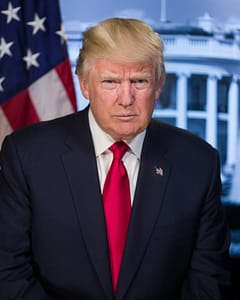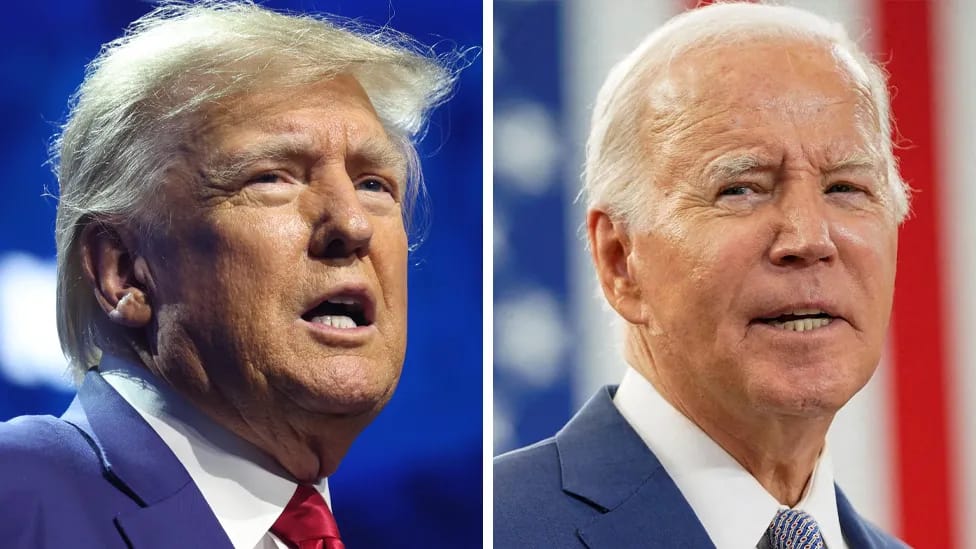

Donald Trump told his enthusiastic supporters he would “take back our country” after a strong performance in the Super Tuesday primary elections. During an event at his Mar-a-Lago estate in Florida, Trump celebrated, stating, “this has been a day we’ve been waiting for,” despite addressing a crowd that seemed less energetic than expected.
Conversely, President Joe Biden faced little challenge in securing the Democratic nominations, cruising through the contests with ease.
The outcome of these primaries virtually sets the stage for a rerun of the 2020 election showdown.
Both Trump and Biden are gearing up to present the upcoming election as a crucial battle for the nation’s future, hinting at a rematch that promises to be as contentious as their first face-off four years ago.
Polls suggest that many Americans are reluctant to choose between Biden and Trump once more, yet such a matchup in November appears inevitable.
Despite a general lack of enthusiasm, both men dominated nearly all their respective contests on Super Tuesday—a pivotal day in the U.S. election calendar when voters in 15 states and one territory make their picks.
According to projections by the BBC’s U.S. partner CBS, Trump is expected to clinch victories in states including Alabama, Arkansas, California, and several others.
Biden is projected to win in these and additional states like Utah and Vermont, also securing a victory in the Iowa caucus, which announced its results that Tuesday.
As the victories piled up on Super Tuesday, both candidates cast the other as a danger to the United States.
At Mar-a-Lago, Trump warned, “if we lose the election, we’re not going to have a country left.”
Prior to Trump’s speech, Biden issued a statement accusing his rival of being “driven by grievance and grift,” lacking genuine concern for the nation.
“Tonight’s results leave the American people with a clear choice,” Biden asserted. “Are we going to keep moving forward, or will we allow Donald Trump to drag us backwards into the chaos, division, and darkness that defined his term in office?”
Throughout his speech, Trump painted a rosy picture of his turbulent presidency and revisited several themes from his previous campaign.
Immigration remained a focal point, a critical issue for Republican voters early in the primaries. Trump described the surge of migrants at the U.S. southern border as an “invasion,” mirroring the firm stance that boosted his initial campaign.
Trump also reiterated his belief that his presidency would lead to fewer global conflicts and promised economic improvements for Americans if he were to return to office.
The Super Tuesday primaries are seen as a barometer of support for Biden and Trump across different states and among various demographics. It’s also an opportunity to gauge party enthusiasm and voter engagement.
Key takeaways from Tuesday night included:
- Nikki Haley, Trump’s sole remaining Republican challenger, is projected to win the Vermont primary.
- Biden experienced a rare defeat in American Samoa, losing the caucuses to a relatively unknown contender, Jason Palmer.
- In Minnesota, a significant portion of Democratic voters chose “uncommitted,” signaling discontent with Biden’s stance on Israel and Gaza.
- North Carolina has determined its gubernatorial race candidates: Republican Mark Robinson and Democrat Josh Stein.
- The California U.S. Senate race will see Democrat Adam Schiff and Republican Steve Garvey, a former baseball player, move to the general election.
- In Texas’s Senate race, Democrat Collin Allred, a former NFL player, is projected to challenge Republican Ted Cruz.
While the presidential race seems predetermined, the importance of primary contests in securing a party’s nomination underscores the significance of Super Tuesday.
By the end of Super Tuesday, about a third of the total delegate count available to presidential candidates throughout the entire nominating process will have been distributed.
Trump’s campaign is optimistic, anticipating reaching the delegate threshold required for nomination later this month.
Though Biden and Trump have effectively secured their party nominations, political analysts are closely watching for potential shifts in support. So far, some Democrats have expressed their reservations by voting “uncommitted,” and on the Republican side, anti-Trump voters have rallied behind Haley, Trump’s former UN ambassador.
Despite not making a significant impact on Tuesday, Haley’s campaign highlighted the continued search among Republican primary voters for an alternative to Trump, stating, “In state after state, there remains a large block of Republican primary voters who are expressing deep concerns about Donald Trump. That is not the unity our party needs for success. Addressing those voters’ concerns will make the Republican Party and America better.”


[…] Read Also: Trump and Biden are on the verge of a rematch as they lead in state primary elections. […]